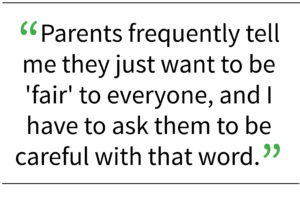Is it fair for the wealthy son to receive the same as his struggling sister?
By James Ward

James Ward
It’s an old estate planning adage: What’s fair is hardly ever equal, and what’s equal is hardly ever fair.
Think about it. Do you divide your estate equally to your three children when you’ve already helped one? Do you divide equally when one has given up their employment and cared for you for 10 years? Is it “fair” to leave the million-dollar home to the child who is going to move in and care for you, but then you pass away after receiving care for only six months?
One client’s daughter had been estranged for several years, but came back to stay with Mom so the daughter was going to inherit the home. Once the daughter found out Mom wanted to include her sons in a joint meeting to discuss everything with me, the daughter disappeared again. One brother commented that there were prior drug issues with the daughter. What’s fair? Now the sons are providing Mom’s care.
One client called me several times to give him a “reality check” because their daughter was pressuring them to transfer the house to her now rather than waiting until they passed. Really? Where would the parents then live? The home represented about 75 percent of their estate, but they had four kids. Was it “fair” to give one child 75 percent of the estate and also risk losing the security of having a place to live? What happens to the parents if the daughter loses their residence in a lawsuit or scam? Do they just become homeless at 80 years of age? What happens if the parents need to sell the home to raise money for their own care or assisted living?
In another family, one son borrowed $200,000 several years ago as a down payment on a lot, and then he built a large house that had appreciated considerably. Since he had promised to repay the loan and never did, the parents thought it was only “fair” to reduce his inheritance by $200,000 so all children were treated more or less equally. The result? The son was furious. He shredded his parents’ legal documents and stormed out. Well, we keep digital copies, so we just emailed a copy to the daughter and then printed a new copy for the parents.
 Parents frequently tell me they just want to be “fair” to everyone, and I have to ask them to be careful with that word. What’s fair to one may not seem fair to another, and the parents have to make hard decisions. I explain their concept of fair may not be what anyone else thinks is fair. Is it fair for the wealthy son to receive the same as his struggling sister? Is it fair for him to receive less? Is it fair when the struggling child gets the house because they’re the only child without a house, but the others have worked hard for years to afford their own homes? What about one child who has less because they raised four children and paid for college for them, but the other child has more now because they decided to not have children? What’s “fair”?
Parents frequently tell me they just want to be “fair” to everyone, and I have to ask them to be careful with that word. What’s fair to one may not seem fair to another, and the parents have to make hard decisions. I explain their concept of fair may not be what anyone else thinks is fair. Is it fair for the wealthy son to receive the same as his struggling sister? Is it fair for him to receive less? Is it fair when the struggling child gets the house because they’re the only child without a house, but the others have worked hard for years to afford their own homes? What about one child who has less because they raised four children and paid for college for them, but the other child has more now because they decided to not have children? What’s “fair”?
 These are not easy issues. They never have been, and they never will be. But they are issues that require a reasoned decision the parents can live with. Will everyone in the family agree? That’s rare, and likely wishful thinking, but the decision requires careful consideration. Will everyone get it right? Probably not, but what’s right? That’s what exists in your mind.
These are not easy issues. They never have been, and they never will be. But they are issues that require a reasoned decision the parents can live with. Will everyone in the family agree? That’s rare, and likely wishful thinking, but the decision requires careful consideration. Will everyone get it right? Probably not, but what’s right? That’s what exists in your mind.






